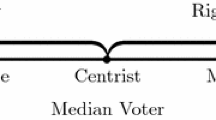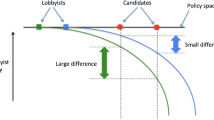Abstract
We analyze the topical question of how the compensation of elected politicians affects the set of citizens choosing to run. To this end, we develop a sparse and tractable citizen-candidate model of representative democracy with ability differences, informative campaigning and political parties. Our results suggest that primaries, campaign costs and rewards have previously overlooked interactions that should be studied in a unified framework. Surprisingly, increasing the reward may lower the average candidate quality when the campaigning costs are sufficiently high.
Similar content being viewed by others
References
Barro, R. (1973). The Control of Politicians: An Economic Model. Public Choice, 14, 19–42.
Besley, T. (2004). Paying Politicians: Theory and Evidence. Journal of the European Economic Association, 2, 193–215.
Besley, T.,&Coate, S. (1997). An Economic Model of Representative Democracy. Quarterly Journal of Economics, 112, 85–114.
Bilodeau, M.,&Slivinski, Al. (1996). Toilet Cleaning and Department Chairing: Volunteering a Public Service. Journal of Public Economics, 59, 299–308.
Bliss, C.,&Nalebuff, B. (1984). Dragon Slaying and Ballroom Dancing: The Private Supply of a Public Good. Journal of Public Economics, 25, 1–12.
Caillaud, B.,&Tirole, J. (2002). Parties as Political Intermediaries. Quarterly Journal of Economics, 117, 1453–1491.
Carrillo, J. D.,&Mariotti, T. (2001). Electoral Competition and Politician Turnover. European Economic Review, 45, 1–25.
Caselli, F.,&Morelli, M. (2004). Bad Politicians. Journal of Public Economics, 88, 759–782.
Drazen, A. (2000). Political Economy in Macroeconomics. Princeton, NJ: Princeton University Press.
Ferejohn, J. (1986). Incumbent Performance and Electoral Control. Public Choice, 50, 5–26.
Gersbach, H. (2004). Competition of Politicians for Incentive Contracts and Elections. Public Choice, 121, 157–177.
Gersbach, H.,&Liessem, V. (2001). Reelection Threshold Contracts in Politics. CESifo Working Paper No. 622.
Holmström, B. (1982). Managerial Incentive Problem—A Dynamic Perspective. In Essays in economics and Management in Honor of Lars Wahlbeck. Swedish School of Economics: Helsinki. Reprinted in Review of Economic Studies, (1999) 66, 169–182.
Messner, M.&Polborn, M. K. (2004). Paying Politicians. Journal of Public Economics, 88, 2423–2445.
Nye Jr.,&Joseph S. (2002). Put Some Polish on Government Service. The Washington Post, Op-ed on August 21, 2001.
Osborne, M. J.,&Slivinski, A. (1996). A Model of Political Competition with Citizen Candidates. Quarterly Journal of Economics, 111, 65–96.
Persson, T.,&Tabellini, G. (2000). Political economics. Cambridge, MA: MIT Press.
Poutvaara, P. (2003). Party Platforms with Endogenous Party Membership. Public Choice, 117, 79–98.
Prat, A. (2002). Campaign Advertising and Voter Welfare. Review of Economic Studies, 69, 999–1017.
Rogoff, K. (1990). Equilibrium Political Budget Cycles. American Economic Review, 80, 21–36.
Rogoff, K.,&Sibert, A. (1988). Elections and Macroeconomic Policy Cycles. Review of Economic Studies, 55, 1–16.
Schultz, C. (2003). Strategic campaigns and Redistributive Politics. Mimeo, University of Copenhagen.
Author information
Authors and Affiliations
Corresponding author
Additional information
JEL Classification D70 · D72 · D79
Rights and permissions
About this article
Cite this article
Poutvaara, P., Takalo, T. Candidate quality. Int Tax Public Finan 14, 7–27 (2007). https://doi.org/10.1007/s10797-006-6691-2
Issue Date:
DOI: https://doi.org/10.1007/s10797-006-6691-2




